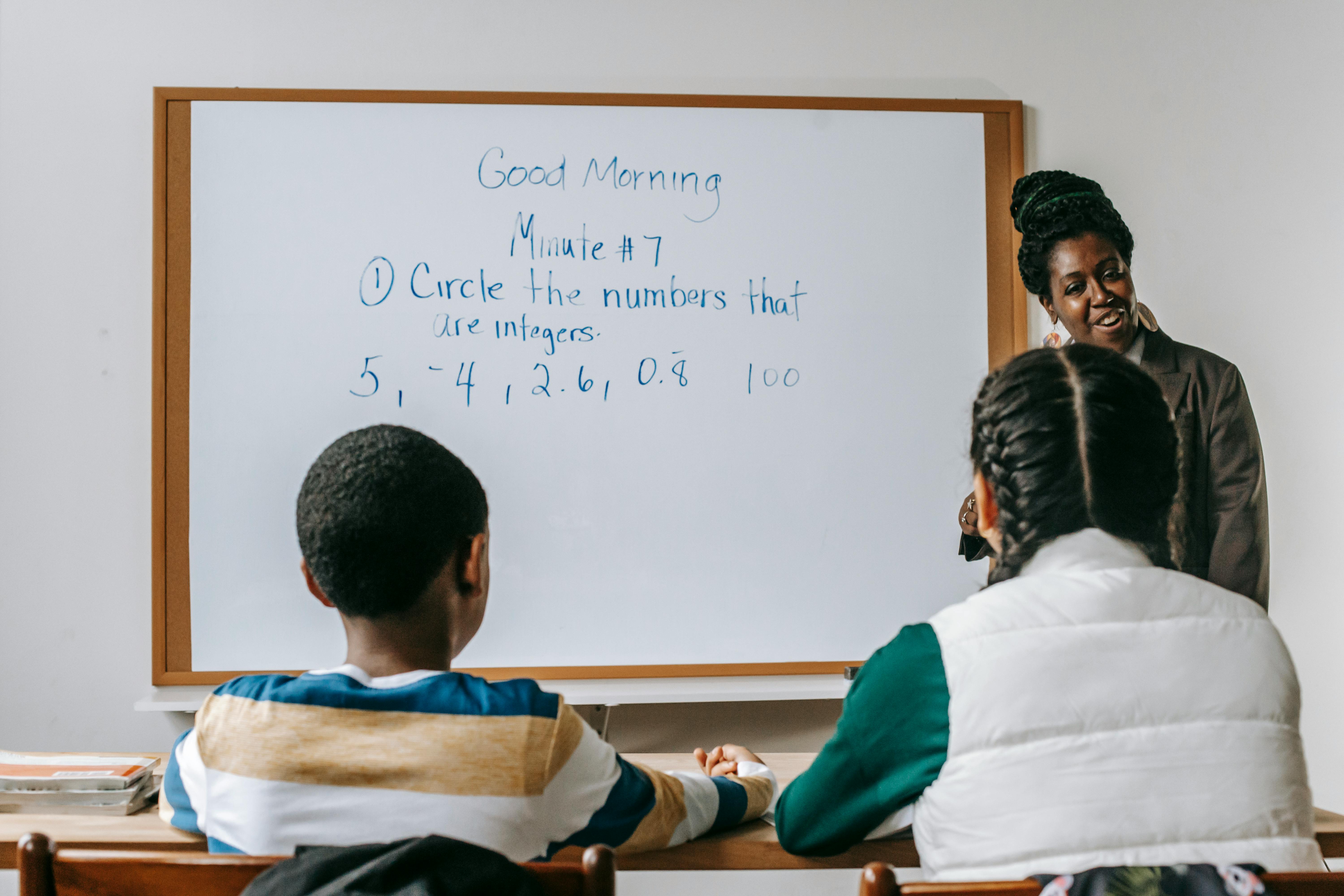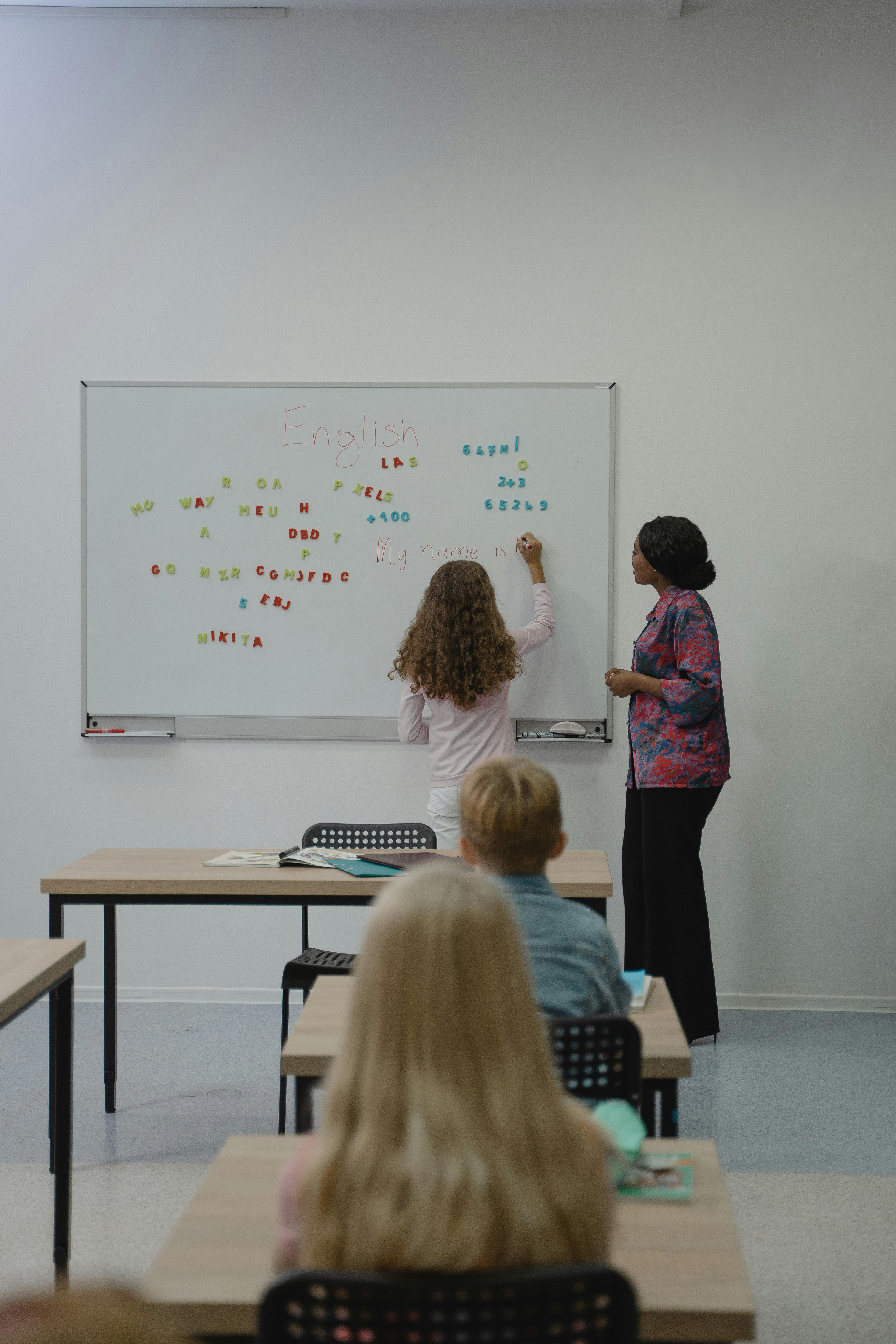
Mathematics 5 Tutoring Program
Our Mathematics 5 Tutoring Program is designed to help students build a strong foundation in key mathematical concepts covered in the Grade 5 curriculum. Through personalized lessons and engaging activities, students will deepen their understanding of topics such as fractions, decimals, geometry, data analysis, and basic algebra. The program focuses on problem-solving skills, critical thinking, and real-world applications, making math both approachable and enjoyable. With a patient, supportive approach, our tutors work to boost confidence, reinforce classroom learning, and prepare students for success in higher levels of math. This program is ideal for students who need extra support, or for those seeking to strengthen their math skills in a focused, one-on-one setting.
- Teacher: Bouyela Education Corporation

Course Description: Grade 5 English Tutoring
This Grade 5 English tutoring course is designed to enhance students' reading, writing, and comprehension skills, building a strong foundation for future academic success. Through a variety of engaging and interactive activities, students will:
Develop Reading Skills: Improve fluency and comprehension by exploring a diverse range of texts, including fiction, non-fiction, and poetry. Students will practice identifying main ideas, supporting details, and making inferences.
Enhance Writing Abilities: Focus on writing clear and coherent sentences and paragraphs. Students will learn to craft different types of writing, including narratives, descriptive essays, and informative pieces, while paying attention to grammar, punctuation, and style.
Strengthen Vocabulary and Spelling: Expand vocabulary through targeted exercises and context-based learning. Regular spelling practice will reinforce word recognition and spelling patterns.
Improve Communication: Foster effective verbal communication through discussions, presentations, and storytelling activities, encouraging confidence and clarity in expressing ideas.
Build Critical Thinking: Engage in activities that promote analytical thinking and problem-solving, helping students to interpret texts and articulate their thoughts critically.
The course is tailored to meet the individual needs of each student, with personalized instruction and feedback provided. By the end of the course, students will have a solid grasp of Grade 5 English language arts concepts and be well-prepared for their upcoming academic challenges.
- Teacher: Bouyela Education Corporation

Welcome to French Immersion 5! This course is designed to deepen your understanding of the French language and culture, building on skills acquired in previous levels. As an advanced course, it will enhance your proficiency in both written and spoken French, and encourage a greater appreciation of Francophone cultures.
Course Objectives:
Advanced Language Skills: Refine your grammar and vocabulary through complex sentence structures and nuanced expressions. You'll practice advanced verb tenses, including the subjunctive mood and various conditional forms, to express sophisticated ideas and opinions.
Cultural Exploration: Dive into diverse Francophone cultures through literature, film, music, and current events. Analyze and discuss cultural themes and historical contexts to gain a broader perspective on the French-speaking world.
Conversational Fluency: Engage in discussions on a variety of topics, from societal issues to personal experiences. Develop the ability to articulate and defend your viewpoints while responding thoughtfully to others.
Reading and Writing Proficiency: Read and interpret challenging texts, including short stories, essays, and articles. Write analytical essays, creative pieces, and formal correspondence to enhance your written expression and critical thinking skills.
Immersive Experiences: Participate in immersive activities such as role-playing, debates, and presentations. Utilize multimedia resources and technology to practice language skills in real-world contexts.
Key Topics:
- Advanced Grammar: Mastery of complex tenses, moods, and syntax.
- Literary Analysis: Study of classical and contemporary French literature.
- Cultural Studies: Exploration of history, traditions, and contemporary issues in Francophone countries.
- Media and Communication: Analysis of French films, news, and social media.
- Practical Applications: Real-life scenarios for effective language use.
Assessment Methods:
- Class Participation: Active engagement in discussions and activities.
- Assignments: Regular essays, reports, and creative writing tasks.
- Projects: Group and individual projects related to cultural or linguistic themes.
- Exams: Written and oral exams to test comprehension and language skills.
By the end of this course, you will have achieved a higher level of fluency and cultural competence, ready to use French in both professional and personal contexts with confidence and sophistication.
- Teacher: Bouyela Education Corporation
The expectations for Grades 4 to 6 build on students’ experiences in the primary grades
and further develop the knowledge and skills they need for physical and health literacy.
Because the base of knowledge, experience, and skills varies from student to student, it is
important for instruction to be differentiated to meet a wide range of student needs. The
emphasis in the junior grades should be on building students’ understanding of themselves in relation to others.
- Teacher: Bouyela Education Corporation

OVERVIEW
In Grade 5 social studies, students will learn about key characteristics of various Indigenous
nations and European settler communities prior to 1713, in what would eventually become
Canada. Using primary sources, such as treaties, historical images, and diaries, as well as
secondary sources, they will investigate, from a variety of perspectives, relationships
within and interactions between these communities as well as the impact of colonialism.
They will develop their understanding of how historical events during this time have
had an impact on present-day Canada. Students will also explore the responsibilities of
Canadian citizens and levels of government. They will continue to develop their ability
to examine current issues from various perspectives by investigating a Canadian social
and/or environmental issue from the point of view of a variety of stakeholders, and
they will develop plans of action to address significant social and environmental issues.
Students will also begin to understand the impact of colonialism on contemporary Canada.
They will continue to develop their mapping, globe, and graphing skills to help them
extract, interpret, and analyze information, and they will enhance their understanding of
multiple perspectives on both historical and contemporary issues.
The Grade 5 social studies expectations provide opportunities for students to explore
a number of concepts connected to the citizenship education framework (see page 10),
including collaboration and cooperation, decision-making, respect, rights and responsibilities,
and stewardship.
The following chart presents an overview of the Grade 5 social studies curriculum and
is meant to provide a starting point for planning instruction. For each overall expectation
(listed in the first column), it identifies a related concept (or concepts) of social studies
thinking and a big idea (see pages 14 and 13 for an explanation of big ideas and the
concepts of disciplinary thinking and page 60 for definitions of the concepts of social
studies thinking). General framing questions are provided for each strand to stimulate
students’ curiosity and critical thinking and to heighten the relevance of what they are
studying. These broad and often open-ended questions can be used to frame a set of
expectations, a strand, or a cross-disciplinary unit. The final column suggests ways in
which spatial skills can be introduced and/or developed at this grade level and indicates
specific expectations with which they can be used (see page 25 for a description of
spatial skills).
- Teacher: Bouyela Education Corporation
A. LISTENING OVERALL EXPECTATIONS
By the end of Grade 5, students will:
- A1. Listening to Understand: determine meaning in a variety of oral French texts, using a range of listening strategies;
- A2. Listening to Interact: interpret messages accurately while interacting in French for a variety of purposes and with diverse audiences;
- A3. Intercultural Understanding: demonstrate an understanding of information in oral French texts about aspects of culture in diverse French-speaking communities and other communities around the world, and of French sociolinguistic conventions used in a variety of situations and communities.
B. SPEAKING OVERALL EXPECTATIONS
By the end of Grade 5, students will:
- B1. Speaking to Communicate: communicate information and ideas orally in French, using a variety of speaking strategies and age- and grade-appropriate language suited to the purpose and audience;
- B2. Speaking to Interact: participate in spoken interactions in French for a variety of purposes and with diverse audiences;
- B3. Intercultural Understanding: in their spoken communications, demonstrate an awareness of aspects of culture in diverse French-speaking communities and other communities around the world, and of the appropriate use of French sociolinguistic conventions in a variety of situations.
C. READING OVERALL EXPECTATIONS
By the end of Grade 5, students will:
- C1. Reading Comprehension: determine meaning in a variety of French texts, using a range of reading comprehension strategies;
- C2. Purpose, Form, and Style: identify the purpose(s) and characteristics of a variety of adapted and authentic text forms, including fictional, informational, graphic, and media forms;
- C3. Intercultural Understanding: demonstrate an understanding of information in French texts about aspects of culture in diverse French-speaking communities and other communities around the world, and of French sociolinguistic conventions used in a variety of situations and communities.
D. WRITING OVERALL EXPECTATIONS
By the end of Grade 5, students will:
- D1. Purpose, Audience, and Form: write French texts for different purposes and audiences, using a variety of forms;
- D2. The Writing Process: use the stages of the writing process – including pre-writing, producing drafts, revising, editing, and publishing – to develop and organize content, clarify ideas and expression, correct errors, and present their written work effectively;
- D3. Intercultural Understanding: in their written work, demonstrate an awareness of aspects of culture in diverse French-speaking communities and other communities around the world, and of the appropriate use of French sociolinguistic conventions in a variety of situations.
- Teacher: Bouyela Education Corporation
A. LISTENING OVERALL EXPECTATIONS
By the end of Grade 5, students will:
- A1. Listening to Understand: determine meaning in a variety of oral French texts, using a range of listening strategies;
- A2. Listening to Interact: interpret messages accurately while interacting in French for a variety of purposes and with diverse audiences;
- A3. Intercultural Understanding: demonstrate an understanding of information in oral French texts about aspects of culture in diverse French-speaking communities and other communities around the world, and of French sociolinguistic conventions used in a variety of situations and communities.
B. SPEAKING OVERALL EXPECTATIONS
By the end of Grade 5, students will:
- B1. Speaking to Communicate: communicate information and ideas orally in French, using a variety of speaking strategies and age- and grade-appropriate language suited to the purpose and audience;
- B2. Speaking to Interact: participate in spoken interactions in French for a variety of purposes and with diverse audiences;
- B3. Intercultural Understanding: in their spoken communications, demonstrate an awareness of aspects of culture in diverse French-speaking communities and other communities around the world, and of the appropriate use of French sociolinguistic conventions in a variety of situations.
C. READING OVERALL EXPECTATIONS
By the end of Grade 5, students will:
- C1. Reading Comprehension: determine meaning in a variety of French texts, using a range of reading comprehension strategies;
- C2. Purpose, Form, and Style: identify the purpose(s) and characteristics of a variety of adapted and authentic text forms, including fictional, informational, graphic, and media forms;
- C3. Intercultural Understanding: demonstrate an understanding of information in French texts about aspects of culture in diverse French-speaking communities and other communities around the world, and of French sociolinguistic conventions used in a variety of situations and communities.
D. WRITING OVERALL EXPECTATIONS
By the end of Grade 5, students will:
- D1. Purpose, Audience, and Form: write French texts for different purposes and audiences, using a variety of forms;
- D2. The Writing Process: use the stages of the writing process – including pre-writing, producing drafts, revising, editing, and publishing – to develop and organize content, clarify ideas and expression, correct errors, and present their written work effectively;
- D3. Intercultural Understanding: in their written work, demonstrate an awareness of aspects of culture in diverse French-speaking communities and other communities around the world, and of the appropriate use of French sociolinguistic conventions in a variety of situations.
- Teacher: Bouyela Education Corporation

In Grade 5 French Immersion, students will primarily focus on developing their listening, speaking, reading, and writing skills, as well as their intercultural understanding. The specific expectations for each area are as follows:
A. Listening:
- Students will determine the meaning in a variety of oral French texts using listening strategies.
- They will interpret messages accurately while interacting in French for various purposes and with diverse audiences.
- They will demonstrate an understanding of information in oral French texts about aspects of culture in diverse French-speaking communities and other communities around the world, as well as French sociolinguistic conventions used in different situations and communities.
B. Speaking:
- Students will communicate information and ideas orally in French, using a variety of speaking strategies and age- and grade-appropriate language suited to the purpose and audience.
- They will participate in spoken interactions in French for various purposes and with diverse audiences.
- They will demonstrate an awareness of aspects of culture in diverse French-speaking communities and other communities around the world, and use appropriate French sociolinguistic conventions in different situations.
C. Reading:
- Students will develop the ability to determine the meaning in a variety of French texts using reading comprehension strategies.
- They will identify the purpose and characteristics of different adapted and authentic text forms, including fiction, informational, graphic, and media forms.
- They will demonstrate an understanding of information in French texts about aspects of culture in diverse French-speaking communities and other communities worldwide. They will also learn about French sociolinguistic conventions used in different situations and communities.
D. Writing:
- Students will learn to write French texts for different purposes and audiences, using various forms.
- They will utilize the writing process stages to develop and organize their content, clarify ideas and expressions, correct errors, and present their written work effectively.
- They will demonstrate an awareness of aspects of culture in diverse French-speaking communities and other communities worldwide in their written work. They will also learn to appropriately use French sociolinguistic conventions in different situations.
Throughout Grade 5 French Immersion, students will work on developing their language skills and cultural understanding to effectively comprehend, communicate, and express themselves in French.
- Teacher: Bouyela Education Corporation

Grade 5 Mathematics focuses on promoting a positive math identity and well-being while developing essential math skills. The curriculum covers various strands, including social-emotional learning, number sense, algebra, data literacy, spatial sense, and financial literacy. Students learn to apply math processes, understand numbers, solve real-life problems, explore patterns and relationships, work with variables and expressions, analyze data, apply geometric properties, make measurements, and develop financial knowledge. By the end of Grade 5, students will have a solid foundation in mathematics and the ability to make informed decisions in practical situations.
- Teacher: Bouyela Education Corporation